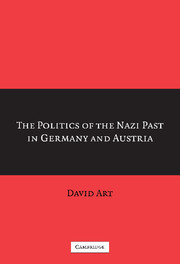Crossref Citations
This Book has been
cited by the following publications. This list is generated based on data provided by Crossref.
Prainsack, Barbara
and
Gmeiner, Robert
2008.
Clean Soil and Common Ground: The Biopolitics of Human Embryonic Stem Cell Research in Austria.
Science as Culture,
Vol. 17,
Issue. 4,
p.
377.
Philpott, Daniel
2008.
Confronting Evil in International Relations.
p.
115.
Kaelber, Lutz
2012.
Child Murder in Nazi Germany: The Memory of Nazi Medical Crimes and Commemoration of “Children’s Euthanasia” Victims at Two Facilities (Eichberg, Kalmenhof).
Societies,
Vol. 2,
Issue. 3,
p.
157.
Buhr, Renee L.
2012.
Seizing the Opportunity: Euroscepticism and Extremist Party Success in the Post-Maastricht Era.
Government and Opposition,
Vol. 47,
Issue. 4,
p.
544.
2013.
Varieties of Right-Wing Extremism in Europe.
p.
15.
Virchow, Fabian
2016.
Handbuch Rechtsextremismus.
p.
5.
Volkmer, Michael Julian Emanuel
2016.
No Austrians in South Tyrol? Why the German-speaking community in Italy’s South Tyrol (Alto Adige) province is not usually called an Austrian minority.
Sprawy Narodowościowe. Seria nowa,
p.
48.
Blee, Kathleen M.
2017.
Understanding Racist Activism.
p.
180.
Hemker, Johannes
and
Rink, Anselm
2017.
Multiple Dimensions of Bureaucratic Discrimination: Evidence from German Welfare Offices.
American Journal of Political Science,
Vol. 61,
Issue. 4,
p.
786.
Anstead, Nick
2018.
The Idea of Austerity in British Politics, 2003–2013.
Political Studies,
Vol. 66,
Issue. 2,
p.
287.
Hoerner, Julian M.
Jaax, Alexander
and
Rodon, Toni
2019.
The long-term impact of the location of concentration camps on radical-right voting in Germany.
Research & Politics,
Vol. 6,
Issue. 4,
p.
205316801989137.
Manucci, Luca
2019.
Populism and Collective Memory.
p.
1.
TAN, Tian
2019.
From Electoral Breakthrough to Ruling Camp: A Comparative Study on the Mainstreaming of the Populist Radical Right Parties in Western Europe.
The Annuals of Japanese Political Science Association,
Vol. 70,
Issue. 2,
p.
2_233.
Ellinas, Antonis A.
2020.
Organizing Against Democracy.
de Leeuw, Sjifra E
Azrout, Rachid
Rekker, Roderik S B
and
Van Spanje, Joost H P
2020.
After All This Time? The Impact of Media and Authoritarian History on Political News Coverage in Twelve Western Countries.
Journal of Communication,
Vol. 70,
Issue. 5,
p.
744.
Rossell Hayes, Alexander
and
Dudek, Carolyn Marie
2020.
How Radical Right-Wing Populism Has Shaped Recent Migration Policy in Austria and Germany.
Journal of Immigrant & Refugee Studies,
Vol. 18,
Issue. 2,
p.
133.
Higuchi, Naoto
2020.
Civil Society and the State in Democratic East Asia.
Ellinas, Antonis
and
Lamprianou, Iasonas
2021.
Societal Responses to Right-Wing Extremism: Antifascist Mobilisation against Golden Dawn in Greece.
South European Society and Politics,
Vol. 26,
Issue. 4,
p.
437.
2021.
Europas moderner Rechtsextremismus.
p.
105.
de Leeuw, Sjifra E.
Rekker, Roderik
Azrout, Rachid
and
van Spanje, Joost H. P.
2021.
Are would-be authoritarians right? Democratic support and citizens’ left-right self-placement in former left- and right- authoritarian countries.
Democratization,
Vol. 28,
Issue. 2,
p.
414.





